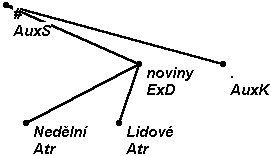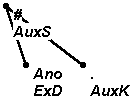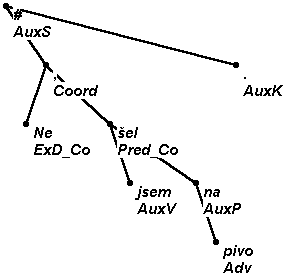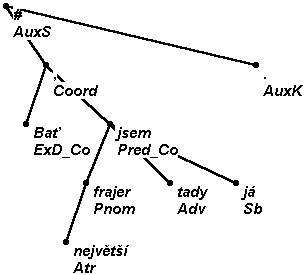One-member verbless sentences also belong to the afun ExD (see part Representation of one-member verbless sentences); there are several types of these sentences all treated in the same way (part Types of one-member verbless sentences).
One-member sentenes not containing a verb are assigned afun ExD.
If the Vocative or the interjection is embedded (e.g. Franto, pojď sem! Franta, come here!, Hej, nevíš, kam jde? Hi, don't you happen to know where he is going?), they get afun ExD (see A syntactially non-incorporated sentence part or sentential form; ellipsis; an independent sentence part; vocative; interjection Exd_Pa).
In some cases, the interjection may have the function Pred (e.g. Hybaj domů! Rush home!; see the part Simple verbal predicate.
One-member infinitival sentences get the afun Pred (Být pořád mladý! To be young all the time, Nemít tolik práce. Not to have so much work).
A special case of one-member sentences is constituted by the words ano (yes), ne (no), ni (not), ba (even so), bať (even so) and words similar to those. If they stand alone (see ex. (1)), they are assigned afun ExD, in a similar vein as other one member sentences. It is often the case that a sentence is attached to these words; this is formally treated as coordination, be these words in a relation to the attched sentences (ex. (2)) or not (ex. (3)); in both cases, the given words are assigned afun ExD_Co.



